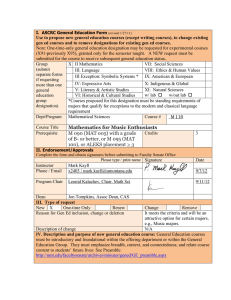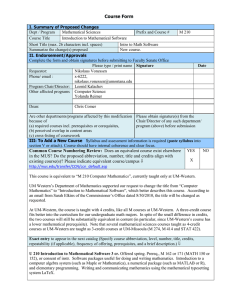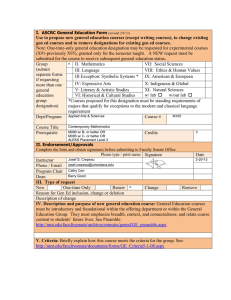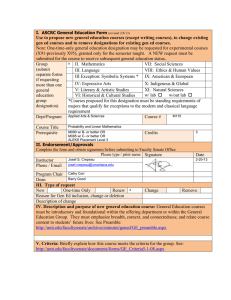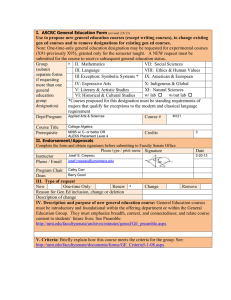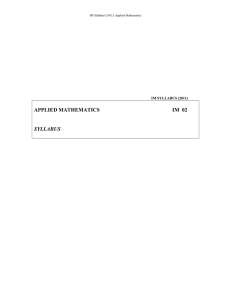Brian A. Birchler MTH 4090 HW 1 8/24/07
advertisement
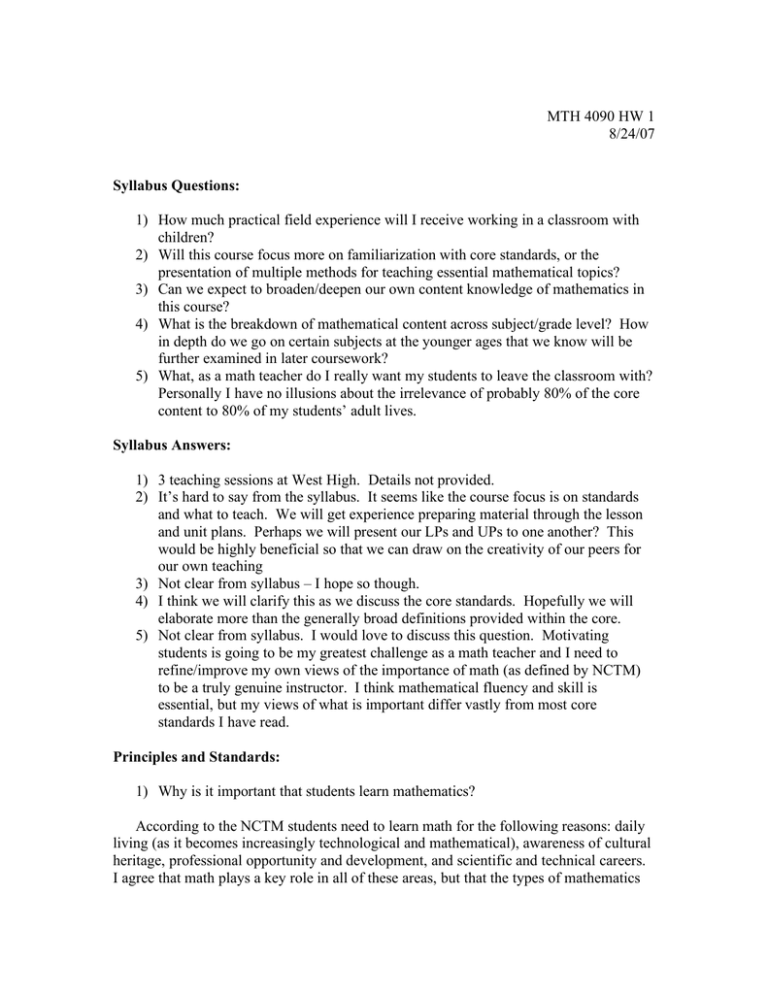
Brian A. Birchler MTH 4090 HW 1 8/24/07 Syllabus Questions: 1) How much practical field experience will I receive working in a classroom with children? 2) Will this course focus more on familiarization with core standards, or the presentation of multiple methods for teaching essential mathematical topics? 3) Can we expect to broaden/deepen our own content knowledge of mathematics in this course? 4) What is the breakdown of mathematical content across subject/grade level? How in depth do we go on certain subjects at the younger ages that we know will be further examined in later coursework? 5) What, as a math teacher do I really want my students to leave the classroom with? Personally I have no illusions about the irrelevance of probably 80% of the core content to 80% of my students’ adult lives. Syllabus Answers: 1) 3 teaching sessions at West High. Details not provided. 2) It’s hard to say from the syllabus. It seems like the course focus is on standards and what to teach. We will get experience preparing material through the lesson and unit plans. Perhaps we will present our LPs and UPs to one another? This would be highly beneficial so that we can draw on the creativity of our peers for our own teaching 3) Not clear from syllabus – I hope so though. 4) I think we will clarify this as we discuss the core standards. Hopefully we will elaborate more than the generally broad definitions provided within the core. 5) Not clear from syllabus. I would love to discuss this question. Motivating students is going to be my greatest challenge as a math teacher and I need to refine/improve my own views of the importance of math (as defined by NCTM) to be a truly genuine instructor. I think mathematical fluency and skill is essential, but my views of what is important differ vastly from most core standards I have read. Principles and Standards: 1) Why is it important that students learn mathematics? According to the NCTM students need to learn math for the following reasons: daily living (as it becomes increasingly technological and mathematical), awareness of cultural heritage, professional opportunity and development, and scientific and technical careers. I agree that math plays a key role in all of these areas, but that the types of mathematics that play a key role are vastly different. I think it is essential that students learn to be analytical thinkers, fluent with arithmetic, and be able to solve everyday problems by identifying unknowns, relationships between variables, and appropriately gathering data. I have mixed feelings about whether or not core standards achieve these objectives 2) How will Principles and Standards help in your work as a teacher? Standards establish a common set of goals and objectives regarding material students should learn. This is highly beneficial in developing lesson plans and mapping out my curriculum for the year. It is also beneficial across grade level and subject area because we can (in theory) expect students to enter our classrooms containing a particular knowledge set. Another advantage of advocating standards is that it initiates discussion about what is the true objective of mathematics education. Standards should be continually discussed and refined to align them with what we hope our students to take from our classrooms. 3) What is most intriguing about the teaching principle and why? I am most intrigued (and concerned for myself) by the need for a ‘deep understanding’ of the subject matter. As I’ve mentioned earlier, I expect motivating my students to be the greatest obstacle to mathematics teaching. To truly excel at motivation, one requires a very high level of mastery in one’s subject area. I am not particularly confident in my ability to link prior to new material in exciting ways, and to connect mathematical content with real world applications and careers on the fly. I know this will improve with time and experience, but it still concerns me. I take some solace in the fact that the book directly states that most educators do not achieve this ‘deep understanding’ during their pre-service training.




